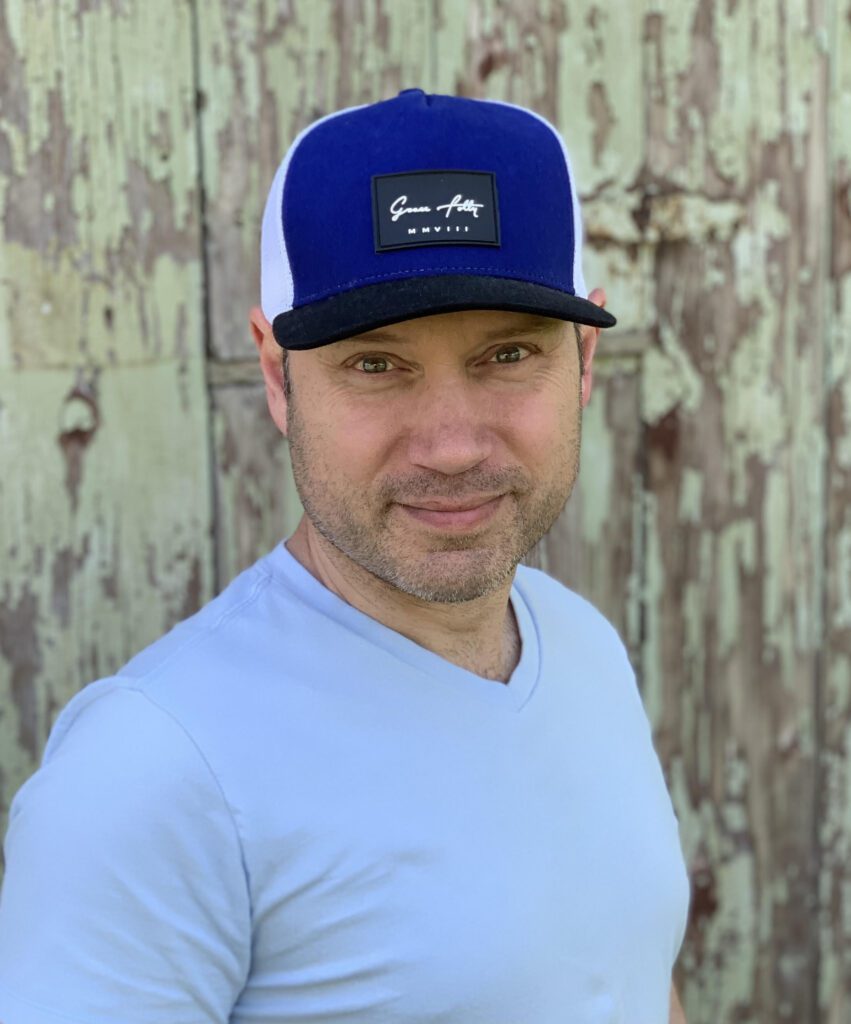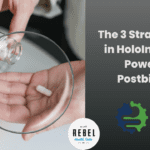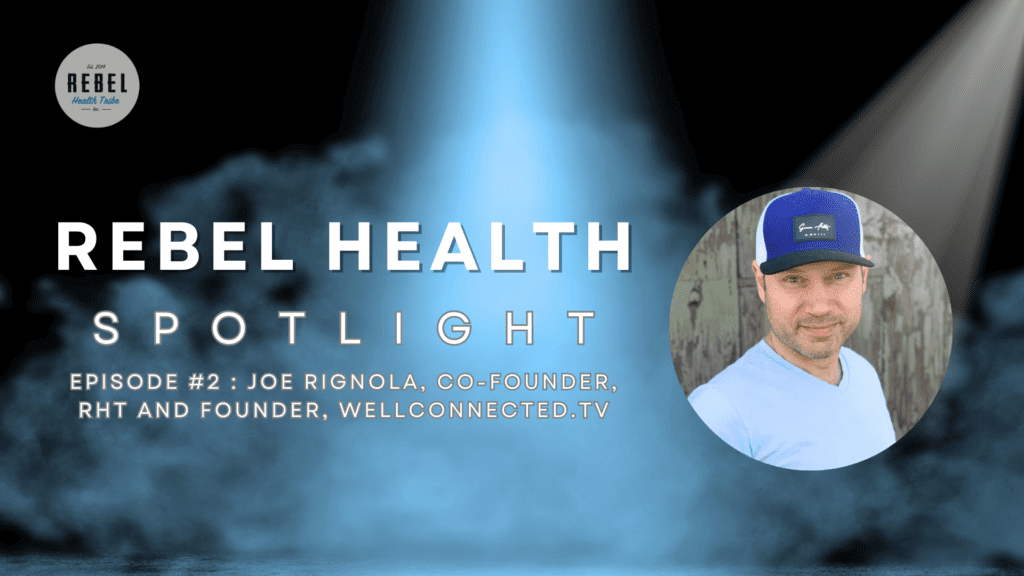
Play Video
Rebel Health Tribe Spotlight – Episode 2: Joe Rignola
For additional interviews and information on Joe Rignola, check out these resources:
Listen to the podcast – Origins of Rebel Health Tribe with Joe Rignola
Listen to the podcast – Overcoming Self Sabotage with Joe Rignola
Check out his website https://wellconnected.tv/

Joe Rignola
About our Guest
Joe Rignola is an entrepreneur, filmmaker, and best-selling author. He began his own health journey about 16 years ago while dealing with depression, anxiety, severe digestive issues, weight gain, and more.
After researching alternatives to the medications he was on, Joe was able to take control of his health and lose over 45 pounds by changing his diet and lifestyle. Filled with gratitude for his newfound health and energy, Joe went back to school to study health and nutrition so he could help others along their journey.
He has founded, co-founded, and launched some of the most successful brands and events in the health space over the past 12 years.
He is the founder of the 170,000-member community, WellConnected.tv
Webinar Transcript
Michael Roesslein:
And we’re live. This is episode two of the Rebel Health Spotlight. I am here with my friend Joe Rignola. Joe, man, it’s fun to be back on the screen.
Joe Rignola:
It’s a pleasure to be here, Mike. I’m a little offended I’m not episode one, but I’ll let it slide.
Michael Roesslein:
I’m episode one.
Joe Rignola:
Okay, that’s fair.
Michael Roesslein:
No, you’re the first guest.
Joe Rignola:
Okay. Oh, then I am honored.
Michael Roesslein:
Yeah, yeah, yeah. You’re the first guest. The first episode, I kind of just introduced the series and what we’re doing, and myself, a little, to any of the new people who haven’t seen any of the other times I’ve done that. So-
Joe Rignola:
Got it.
Michael Roesslein:
… for those who don’t know, Joe is the other co-founder of RHT, which, we are rolling up on 10 years pretty soon.
Joe Rignola:
Crazy, right?
Michael Roesslein:
I think next year is 10 years-
Joe Rignola:
Yeah.
Michael Roesslein:
… from when we first started this thing. And that’s pretty wild.
Joe Rignola:
Yeah, it’s pretty crazy.
Michael Roesslein:
And there’s a long story behind that, and we don’t need to share the whole story, but-
Joe Rignola:
Well, they can go back and watch the podcast episode [inaudible].
Michael Roesslein:
Yeah, the podcast. I think the podcast is also episode two of the podcast has the whole story. So we started RHT and worked together on it for about five years, I think. And then we worked together on Human Longevity Project. And now, I’ll let you tell them a little about yourself and what you’re up to now. And then we can talk about some other things after that.
Joe Rignola:
Yeah, I mean that span of time over the last 10 years or so, has been pretty complex and a lot going on there. So yeah, we worked on Human Longevity and then for the first time in about 10 years, I went out on my own and started my own company again. I started out probably about 13 or 14 years ago with a company called, Wellness Punks, and did that for a few years ago.
Michael Roesslein:
I’m still jealous of that name.
Joe Rignola:
It’s a good name. I lost the domain name though, sadly. So, it’s out there in the ether. Someone else owns it, but all good. So, that was mainly one-on-one coaching. Then we started Rebel Health Tribe with Primal 90 about 10 years ago. So, it feels good and scary to be on my own again. There was obvious benefits to having a business partner with not having to lift all the heavy weight myself and having some accountability and things like that. But I’m happy to be on my own for a lot-
Michael Roesslein:
What’s your new thing?
Joe Rignola:
Yeah, it’s called, WellConnected.tv. That’s the website and the company name. And we have a series of educational masterclasses and there’s a membership there where you can go in and guided meditations and audio courses. So, I have a few audio courses in there which are in different subjects that people can just listen to in their cars or while they’re cleaning or wherever they are, which is really convenient and people seem to like those. We have some masterclasses similar to the ones we did with Revel Health Tribe. The last one we did was called, Rewire Your Brain Masterclass, which is really the direction I see myself going for the foreseeable future. Which is really just about mindset and managing stress and anxiety and dealing with childhood trauma, which we could talk probably for-
Michael Roesslein:
Well, it’s kind of how you got into-
Joe Rignola:
… hours [inaudible].
Michael Roesslein:
It’s kind of full circle a little bit, ’cause I know Joe’s story. So, the thing that got Joe into health and wellness in the first place was, he was taking antidepressants or antianxiety medications or something and started trying… And he got brain zaps, and was having all these crazy side effects from them. And was like, “Okay, this is ridiculous. I need to get myself in order. I need to get my health… I need to prioritize myself and my wellbeing because this is the road that is not a good road that I’m going down.” Which is when you got into the nutrition and the lifestyle stuff and the functional medicine kind of things and whatever.
Joe Rignola:
Yeah. It became clear to me that I wasn’t deficient in Paxil. That was not my issue. So when I tried to wean off of it, I got these brain zaps, which was the short version of it, it kind of feels like you’re sticking your finger in a light socket, only, it’s your brain. And then that’s-
Michael Roesslein:
[inaudible].
Joe Rignola:
… when I realized better way, looked into lifestyle medicine, diet, food, things like that. And that’s where-
Michael Roesslein:
But then it kind of-
Joe Rignola:
… you heal the most.
Michael Roesslein:
… led you eventually in a roundabout way, kind of like myself like a lot of people… You’ve interviewed a lot of people in this industry too, and a lot of functional medicine doctors and other health practitioners, a lot of them got into this because they got sick. They got cancer or they got an autoimmune disease, or they had some digestive problem or some physical health problem. Both of us wound up doing this kind of stuff because we had mental health problems or anxiety or those kinds of things. But neither of us jumped right into doing that kind of work.
Joe Rignola:
Yeah, which seems-
Michael Roesslein:
I don’t know if the diet and the nutrition and the functional medicine stuff is a little more approachable or-
Joe Rignola:
I think it’s approachable and it seems easier. I can change the way I eat, I can go to bed on time, I can get better sleep. I can manage all that lifestyle stuff much easier than managing my thoughts or digging up, not necessarily digging up, but navigating some of the micro traumas. And for me, that’s what it was. For me, it was like a lot of these different seemingly insignificant or micro events.
I just started writing a book, just started. I just started a year ago and I’m only two chapters in, but there’s a chapter in it called, You Had a Shitty Childhood, which basically is like no matter how good your childhood was, and my childhood, by all accounts, was pretty darn good, yet there were still these events that happened that affect me to this day. And I don’t think we put enough weight on these, what are called, small T traumas. And obviously if you have significant trauma loss and abuse and things like that, obviously that needs to be addressed, and those are horrible things. But everyone has some form of trauma. That’s sort of my thesis now. And if you’re continue to just blow it off as, “Oh yeah, it wasn’t a big deal.”, and brush it under the rug, the more it’s going to control you. And that’s kind of where I’m at now. That work never really stops.
Michael Roesslein:
So yeah, I totally agree. And I’ve done a lot of work under Gabor Maté, and he talks about that all the time. And when he’s working with someone and they say, “My childhood was fine, nothing happened.”, he knows he has an interesting client on his hands. Because then he’ll ask a few different probing questions and he’ll find something that drove their behaviors.
And when it comes to physical health stuff, these things also drive physical disease and the stress from it. And when people couldn’t adhere to protocols I would give them or diets or things, and I’d be like, “You have everything in front of you. You’re supposed to do it. Why can’t you do it?” And there’s always a story behind that and a mental side of that and an emotional side of that. And I learned that.
Joe Rignola:
Yeah, very similar-
Michael Roesslein:
… and understand that a lot better.
Joe Rignola:
Yeah, very similar experience. When I started out with Wellness Punks doing coaching, there was actually always almost the flip side of that. I always had a client that complied with everything, really did everything to the T, and yet they still couldn’t get the results. They saw the symptoms, they couldn’t lose the weight, whatever it was. And then we dug a little bit deeper and realized they had some sort of a trauma.
We would refer them out to someone to help them with that. And lo and behold, once they started to process those past traumas, the symptoms would go away. They would lose the weight, they’d feel better, they’d have more energy, all the things. So, that was really the first thing the first time I started to question, yeah, diet and lifestyle is important. Eating clean, organic, all that stuff’s important. But there’s a bigger piece upstream that we need to deal with.
Michael Roesslein:
For sure. So your arc kind of went from having mental health and stress and burnout and all these things, to nutrition and wellness and functional medicines type stuff and lifestyle. And then now more into the mental and thoughts and the emotional and the trauma side. And just one more time, it’s WellConnected.tv’s where people can find the work you’re doing now.
Joe Rignola:
Exactly.
Michael Roesslein:
It’s Rewire Your Brain Masterclass-
Joe Rignola:
Yeah, Rewire Your Brain.
Michael Roesslein:
… was your most recent one, so you’re moving in that direction. So, we’ll have all the links down below for you guys to go check out that stuff. But if you can give people a few things that you’ve learned over the years that would be needle movers. Whether it’s something that’s related more to mental health, or if it’s something from your time with nutrition or lifestyle or any of that that they could walk away from listening to this and start doing tomorrow, what would be a few recommendations you’d make?
Joe Rignola:
I’ll do a couple from each sort of category. First, let’s sort of tackle lifestyle stuff. For me, two of the things that have helped the most, one is intermittent fasting, which for me, I do about an eight-hour window, feeding window. So if you can delay breakfast until about 11 o’clock or 12 o’clock and then have your last meal somewhere around six or seven, there’s so many benefits for that. And we’re obviously not going to have time to talk about all of those things. But just as far as something really simple, that really doesn’t take a lot of effort. Eating your last meal at seven o’clock at night and then not your next meal until 11 o’clock the next morning doesn’t seem that difficult. And it’s not. But there are a tremendous amount of benefits from that.
And then the other thing is cold exposure. It’s super simple. If you can do a cold plunge like an ice bath for 30 seconds to three minutes, a ton of benefits from that. But the most interesting benefit from that is my mental health. I notice… It’s funny, my son, Mason-
Michael Roesslein:
I mean, so you can start with a shower, right?
Joe Rignola:
You can start with a shower.
Michael Roesslein:
Like if you don’t have an ice bath [inaudible]?
Joe Rignola:
For me, I find turning the shower cold is harder than just jumping in an ice bath.
Michael Roesslein:
I agree. And I’ve tried both and I hate both. I understand there’s tons of benefits. I’m like, I hate cold person, so it’s extra hard for me.
Joe Rignola:
Same. Same
Michael Roesslein:
And sitting in a cold body of water is easier for me. Turning the dial on the shower in the water turns cold-
Joe Rignola:
Brutal.
Michael Roesslein:
… and you’re just standing there. I’m like, “Dude, I’d rather get punched in the face.” This is-
Joe Rignola:
But how do you feel right after?
Michael Roesslein:
Usually really good.
Joe Rignola:
Almost euphoric.
Michael Roesslein:
[inaudible] myself for how much I didn’t want to do it.
Joe Rignola:
Exactly. Well, I mean, it’s obvious that there’s like a dopamine hit from that. You survived. Your body thought it was basically going into hypothermia and dying, and then you survived. And so you used a lot of happy chemicals that get released during that process to simplify it. But yeah, there’s obvious benefits to cold thermogenesis and protein and all the benefits. But for me, it’s like the mental benefit of it is amazing.
Michael Roesslein:
Doing something hard.
Joe Rignola:
So, those are two things. Two simple things that people can do. Not necessarily easy, but certainly simple. And they can cost nothing and they can do that right now. As far as the mental health piece, I think the most important thing that I’ve sort of learned over the last several years of digging into this, is that we’re not supposed to do this alone. And you really can’t do it alone.
Michael Roesslein:
What do you mean, this?
Joe Rignola:
What’s that?
Michael Roesslein:
What do you mean, this? We’re not supposed to do this alone.
Joe Rignola:
The deeper sort of inner work, the navigating the past experience, past traumas, the processing of those events. You need to ask for help. But I think that’s probably the biggest thing, asking for help, surrounding yourself with some sort of support group, which could be one person or five people or what have you. But being brave enough to ask for help. And I chose that word intentionally ’cause it does seem like an act of courage or bravery to ask for help. At least, it was for me. And I think that’s true for you too.
Michael Roesslein:
Yeah.
Joe Rignola:
And it’s true for a lot of people.
Michael Roesslein:
And this culture needs to reframe the way that it looks at things like that, because it’s kind of like a bootstrapy, individualistic culture where asking for help is sometimes looked at as weakness or something else.
Joe Rignola:
Exactly. Yeah.
Michael Roesslein:
And it’s difficult to do. And I wouldn’t be here if I didn’t do it.
Joe Rignola:
Absolutely.
Michael Roesslein:
And it’s always better. The fear, the thing you’re afraid of doesn’t happen when you ask for help. So about, they’re going to think this or someone’s going to think this. And even if it’s to a friend, you don’t have to talk to a… Professionals are great, but I don’t think you mean it has to be that, it’s just-
Joe Rignola:
No, it doesn’t have to be, but it probably should be. You probably shouldn’t-
Michael Roesslein:
[inaudible] and then the deeper level things, yeah for sure. And that’s the work I’m starting to do now. And I have been the first person that a lot of people have talked to about any of the things or worked through with any of the things. And I’ve had sessions with people where we finish and I really didn’t do anything or say much at all. And there was a huge shift for them because I listened to what they said. And I sat with them and I didn’t judge it. And I was still there with them at the end, when they had told me the things. And I’ve seen that alone transform people in a pretty powerful way, even without doing anything or saying anything or whatever. [inaudible].
Joe Rignola:
Yeah, but sitting there and listening and being present and creating that space is doing something.
Michael Roesslein:
Because nobody ever listened to them before.
Joe Rignola:
Right, exactly. Simon Sinek has this great quote, for those who know Simon Sinek, he says, “Just sit in the mud with me. That’s it. Just sit in the mud with me.” And sometimes that’s the most powerful thing you can do. So yeah, surround yourself with friends who will listen. And I think we need to normalize therapy. I think having-
Michael Roesslein:
I think that’s happening. I think-
Joe Rignola:
I think so too. Yeah.
Michael Roesslein:
I think that that’s happening. The younger people, maybe not yet with our age, but the younger people for sure.
Joe Rignola:
I think if you’re human, you need someone. You need a therapist, a coach, a mentor, a psychologist, someone who’s going to help guide you through. Someone who maybe is just up the road a little bit further, that could help guide you through. I think it’s super important. We need to normalize therapy. It’s crazy. Like I said, everyone has some form of trauma. Even if you think you had the most amazing childhood, you’re human. Things happen. Tripping on the sidewalk in fifth grade and being laughed at is pretty significant when you’re in fifth grade. We can laugh at it as adults-
Michael Roesslein:
[inaudible]-
Joe Rignola:
… but in fifth grade-
Michael Roesslein:
… the perspective on the things that happened, you look back at it as an adult and you’re like, “That’s not a big deal.”
Joe Rignola:
Exactly.
Michael Roesslein:
But when you’re in fifth grade, that’s-
Joe Rignola:
Everything.
Michael Roesslein:
… that’s the end of the world.
Joe Rignola:
Yep. And that fifth grade is still inside calling the shots and running the show and making-
Michael Roesslein:
Yeah. And then you’d feel like, “I’m going to screw up. I’m going to-
Joe Rignola:
… really bad decisions for you.
Michael Roesslein:
… embarrass myself in front of people. I’m stupid. People are going to laugh at me.” Those stories then get ingrained and then they follow you into your adult life.
Joe Rignola:
Yeah.
Michael Roesslein:
Yeah.
Joe Rignola:
So yeah, look for help, is probably the other thing, is to state something really simple. I do something called take five. I’m not sure if you’re familiar with it. It’s kind of like a breathing tactile exercise where you put your index finger, I don’t know if people are listening or watching this, put your index finger at the base of the palm of your hand, take a deep breath in, and follow it up your thumb. And then breathe out back down to the palm of your hand. And do that with each finger and just take a long, deep, intentional breath with each finger. It’s kind of a way to get you out of that fight or flight mode pretty quickly. So-
Michael Roesslein:
Yeah. Brings you present with some-
Joe Rignola:
And then seek help.
Michael Roesslein:
… [inaudible] touch.
Joe Rignola:
Yeah, exactly. Get you out of your head and into your body, which is super important. That’s a whole episode. We can talk for hours on just getting out of your head and into your body. But that’s a really quick way to do that. And then you should probably still ask for help after that.
Michael Roesslein:
Cool. No, that’s useful. And all of those things are things people can do really easily. So, he shared intermittent fasting, cold water or cold exposure, and asking for help. And then a take five exercise, which he just demonstrated. So, you can play that back and try that out, and let us know what you guys think.
And it’s these little things. The reason I wanted to have these little things at the end of each episode is because when I used to work with functional medicine style clients, people would come and they’d want to do these extravagant protocols. And, “I want to run these six lab tests and take these 22 supplements and go to this therapy and do this thing and do this thing.” And I’m like, “What time do you go to bed?”
Joe Rignola:
Yeah, exactly.
Michael Roesslein:
And they’re like, “One o’clock.” And I’m like, “Let’s work on that first.” And it’s these little tiny things that add up that are free, that are easy, that shift the way your day goes and shift the state that your body’s in. Because if a body’s in a freaked out state and a stressed state and a running state, no matter how many protocols you do, it’s going to stay like that.
Joe Rignola:
Exactly. Yep. Cool.
Michael Roesslein:
Great stuff, man. So, head on over to Joe’s site, wellconnected.TV down below. And check out his masterclasses, check out the videos, the audios there. And Yeah, I’m just grateful you came on, man. It’s always fun to connect. It’s cool, this thing that we created together, and what it’s morphed into and out of and back into and out of over the years. And I’m starting to go do some stuff on my own now for the first time in well, ever really, at this scale, at the scale that we’re at now, like the first time ever, pretty much. And it is a lot different. And it’s like-
Joe Rignola:
It’s scary and awesome and amazing all at the same time.
Michael Roesslein:
Yeah, yeah. But there isn’t… Yeah, you do the heavy lifting and you’re accountable to yourself. And you’re-
Joe Rignola:
Exactly.
Michael Roesslein:
So, it’s good. I think I’m ready for it. I’m fine. I think I can do it. I’m excited for it. So thank you so much, man. Everybody, check anything.
Joe Rignola:
Sure. Thank you.
Michael Roesslein:
Anything we referenced, there’ll be links to it underneath. And you can go check out Joe’s site and Joe’s work. And we’ll see you on the next episode.
Joe Rignola:
Appreciate it.






